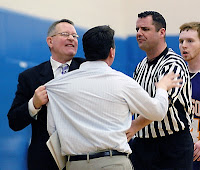"Put your game face on" is one of the many sports expressions that pervade American English. It's an odd expression. I mean how do you put on a new face? Much as I'd like to do it, it seems very hard. Of course in LA plastic surgeons will do it for you.
 Putting on a game face means something quite important, plastic surgery aside. Have you ever stood in front of a mirror and practiced different faces, no, not guitar gyrations, but different faces? It turns out that something important happens when we change our facial expression.
Putting on a game face means something quite important, plastic surgery aside. Have you ever stood in front of a mirror and practiced different faces, no, not guitar gyrations, but different faces? It turns out that something important happens when we change our facial expression.The human face is so powerful and human perception is so face dependent, that faces not only communicate immense amount of information, but they influence our cognitive and emotional states. Changing your face can literally change our brain activity. Smiling can be an exercise to become more happy; frowning can make you more sad, scowling more angry. The face is an exquisite monitor of our emotions but it is also a generator. So putting on a game face can involve changing your internal emotional and cognitive balance.

When an athlete prepares for his or her game, he or she attempts to develop a focus for the game that is appropriate to how they carry themselves best in the game. Some players play best angry or fierce. Others take on a role of care free but focused players. Still others develop an eerie calm that helps them persevere with an even temper amid the chaotic emotions and emotional momentum of a game. Others manifest a preternatural concentration that unites their body, mind and emotions into a flowing zen like movement. Putting on a game face reminds us athletes perform just like Greek tragedy actors who donned masks to play their roles.
The game face focuses and carries the player into combat. Putting on a game face also implies an element of choice and control. If someone "loses it" in competition, they lost their focus and their face reflects it first. They lose the tuned balance of emotion, focus and skill deployment that enables them to perform at their best. Many game plans are built around trying to get players out of their game face and to lose it. Losing it can be contagious neurologically and socially. Whole teams can lose their composure and you see it in their faces. Teams often know when they've won long before they take the lead by the faces or body carriage of an opponent.
Last weekend I watched the University of Washington team have what their coach called a "melt down." In the third quarter of the game the players clearly lost focus, and their faces and body language showed it. They lost some bad calls and could not let go of the calls. Their anger and frustration kept them from complete focus upon the play at hand, instead they were resenting or replaying what they lost. The team imploded with sloppy play and penalties. But the issue here covers not just players but coaching accountability. If you watched the bench, the coaches yelled and rattled around. They contorted and yelled and shouted at the ref. Several had to be restrained from running on the field.
The coaches are leaders. Their demeanor models what the students expect and live up to. If coaches lose it and yell, how are the twenty year olds supposed to keep focused on the game?
Coaches must also put on game faces. Players take their cues from coaches, and as Sun Tzu and his followers emphasized in the Art of War, a leader must be tranquil and clear thinking at all times. Coachers may think they are firing up their players, but their bulging faces and angry strutting only model losing it to their players. Their own contorted faces give permission to players to remain upset.
The coaches' faces create contagion and pass on to the players the anger and lost focus, not just energy and intensity. Coaches need game faces too and having seen enough coaches lose it and not help their teams, I am becoming more comfortable with the Bill Bellichick or Tom Landry school of keep it intense but keep it controlled. Game faces matter for coaches and players. The Washington Husky's young coach Steve Sarkesian admitted as much in a post mortem, ""I am a passionate guy," he said. "I want to do everything I can for our kids to give them the best chance to win. And I felt like there was a point there that maybe my emotions got the best of me because I didn't feel like it was right. But I've got to show more composure, if I want our kids to show more composure." Motivating athletes is one thing; leading them off the edge is another.
Putting on a game face is fundamental to being an athlete or a coach, or for that matter being a professional of any sort. Like the Greek insight into play, when we "play ball' we put on masks that help us perform but also change and reflect whom we are.


I just love him
ReplyDeleteThey lost some bad calls and could not let go of the calls. Their anger and frustration kept them from complete focus upon the play at hand, instead they were resenting or replaying what they lost.
ReplyDelete